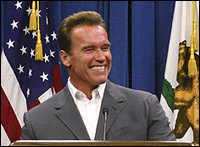Arnold Schwarzenegger‘s exuberant speech last Tuesday at the Republican National Convention suggested that the Governator may be less the moderate Republican than advertised. Hailed by some during the convention as the Obama of the right, the California governor came across as a devout, rock-ribbed Bush lover.

Just days after Schwarzenegger’s speech, more evidence emerged to indicate that this compassionate conservative may be borrowing not-so-compassionate tricks from the Bush-Cheney playbook: An Associated Press story last Friday revealed that a sweeping reform proposal for California state government commissioned by Schwarzenegger was “influenced significantly” by industry interests — in particular, ChevronTexaco, the largest publicly traded company in California and the fifth largest energy company in the world.
“Many corporations and interest groups participated in the governor’s reform plan,” wrote the AP’s Tom Chorneau, “but state records and interviews with the participants show Chevron enjoyed immense success in influencing the report through its array of lobbyists, attorneys, and trade organizations.” The report repeatedly references ChevronTexaco input in footnotes, and its acknowledgements page names at least five lawyers and lobbyists associated with the company.
Last February, some three months after assuming office, Schwarzenegger commissioned a team of 275 state employees to assemble recommendations for the California Performance Review, an analysis of the efficacy of state government. (The report is referred to as the CPR — apropos for a state that currently has a faint economic heartbeat.) Last month, the team unveiled a catalog of recommendations so colossal — coming in at a staggering 2,500 pages — that only the likes of Arnold himself could lift it single-handedly. The proposals could significantly enhance the power of the governor to expedite the legislative process and affect everything from the levying of taxes to the procedures for siting oil refineries.
“This is the biggest government restructuring proposal California has seen in years,” said Bill Magavern, senior legislative representative of the Sierra Club‘s California branch and one of the few environmental advocates who got the chance to offer suggestions on the report during its drafting.
“I know of only a few other environmentalists who were asked for input,” Magavern told Muckraker. “In my case I got a call to attend one two-hour meeting, but I was never asked for feedback on the most important proposals, and very few of our recommendations were reflected in the report.” Magavern said he knew little about industry’s behind-the-scenes influence on CPR because everyone who worked on it was forced to sign a confidentiality agreement that prohibits discussions about the proceedings: “It was a rigorously secretive process.”
Dozens of enviro groups and public-interest organizations say they were shut out of the process entirely. As Ann Notthoff, California legislative director for the Natural Resources Defense Council, explained it, “While the industry interests were able to deploy huge lobbying forces and resources to shoulder their way into the drafting process, public-interest groups simply didn’t have the manpower required to outgun industry at the front end.”
NRDC and other environmental groups have been invited to air their concerns about the report’s recommendations during the formal public comment period, which will last through September, but even here activists are at a disadvantage: “I’ve talked to leaders of community groups in low-income neighborhoods in parts of L.A. who live near industrial sites and are concerned about rollbacks in pollution and siting regulations, but they simply don’t have the time or resources to make a dent in this massive and complex report,” said Notthoff.
Chevron spokesperson Stan Luckoski told Muckraker that by appointing a team of lobbyists and lawyers to contribute to the drafting of the CPR, the company was “just participating in the democratic process.” He said, “As a major California-based company, [it’s perfectly reasonable] that we participated to make recommendations on how to improve the performance of the California economy.”
And the participation didn’t stop there. Chevron donated $100,000 to a political fund directly tied to Schwarzenegger just weeks after the report’s release, according to AP. The company also helped foot the bill for the governor and his staff to attend the GOP convention, and last week Schwarzenegger held a closed-door meeting for officials from Chevron and the other companies that sponsored his travel.
“You have to admit, with all the gag orders and corporate canoodling, this smacks of the Cheney energy task force debacle,” said Denny Larson, coordinator of the National Refinery Reform Campaign, an organization that works to protect communities around the U.S. from oil-refinery pollution.
Executive Sweet
Siting and expanding energy facilities in California has become a concern for oil and gas interests, Chevron in particular, which is currently trying to build a liquefied natural gas facility in Southern California in the face of strong community resistance. Among the long list of concerns enviros have about the reports’ recommendations are the proposals to expedite the permitting and siting processes for constructing and expanding refineries and other energy facilities. Refineries are the biggest generators of hazardous waste in California and among the biggest contributors to the state’s air-pollution problems, according to Magavern.

Perhaps even more objectionable from enviros’ standpoint is the report’s proposal to eliminate the independent commissions and boards that govern the regulation of California’s air, water, and utilities. This means that the California Air Resources Board, for instance, which is responsible for implementing some of the most groundbreaking and effective statewide pollution regulations in the country, would be subsumed within the executive branch.
“The overarching theme of the report is to find ways to put more power into the hands of the executive branch and remove checks on the governor’s power,” Magavern said.
Restructuring is not necessarily a bad thing, said Notthoff, but eliminating key independent boards and commissions is going overboard. “Independent commissions are critical avenues for public input,” she said. “Eliminating them could substantially reduce the opportunities for public comment on decisions regarding the environment.”
These are hardly the kinds of changes one would expect from a leader who has been compared to New York Gov. George Pataki and Arizona Sen. John McCain as one of the most environmentally ambitious Republican politicians in America today — the same man who pledged to build the first hydrogen highway and put solar panels on the rooftops of a million homes in his state.
Some critics see the news of industry influence on the restructuring report as a gloomy bellwether. “Now we are seeing Schwarzenegger’s true environmental colors,” said Larson, “and they’re not green at all.”
Schwarzenegger has insisted that the report doesn’t represent his ideas or those of his administration, pointing out that it’s simply a set of recommendations from an independent task force. “At times the governor and his appointees have sought to distance themselves from the report,” said Magavern. “But then he turns around and talks out of the other side of his mouth, saying he’s going to do everything he can to execute it.” The governor will have to come down on one side or the other within the coming months, as he decides which proposals from the massive report he is going to press forward with.
The problem, as many observers see it, is that Schwarzenegger wants to please everyone. He put Terry Tamminen, a highly reputable environmentalist, in charge of the California EPA to gratify the green community, even as he hired former industry lobbyists to work in key staff positions to make business interests happy.
But he can’t go on playing to both sides. More than half a dozen pro-environment bills are piled up on his desk, including ones that would require stricter tailpipe regulations on old vehicles, crack down on diesel exhaust from idling ships in California ports, curb overfishing in oceans, and protect residential communities from pesticide drift coming off industrial farms. “Between now and the end of September, he’ll either have to sign these bills into law and anger some industry lobbies, or reject them and seriously discourage his green supporters.” says Magavern. “He’s at a crossroads.”
Enviros also hope Schwarzenegger will make more of an effort to follow through with his Million Solar Homes initiative and his hydrogen-highway program, both of which he touts but has made little concrete progress on.
Let’s just hope he’s not waiting for ChevronTexaco to give him the go-ahead.

